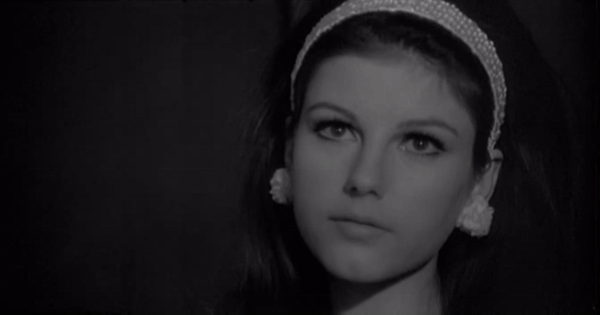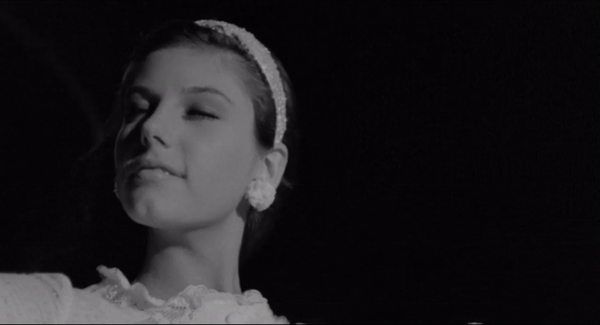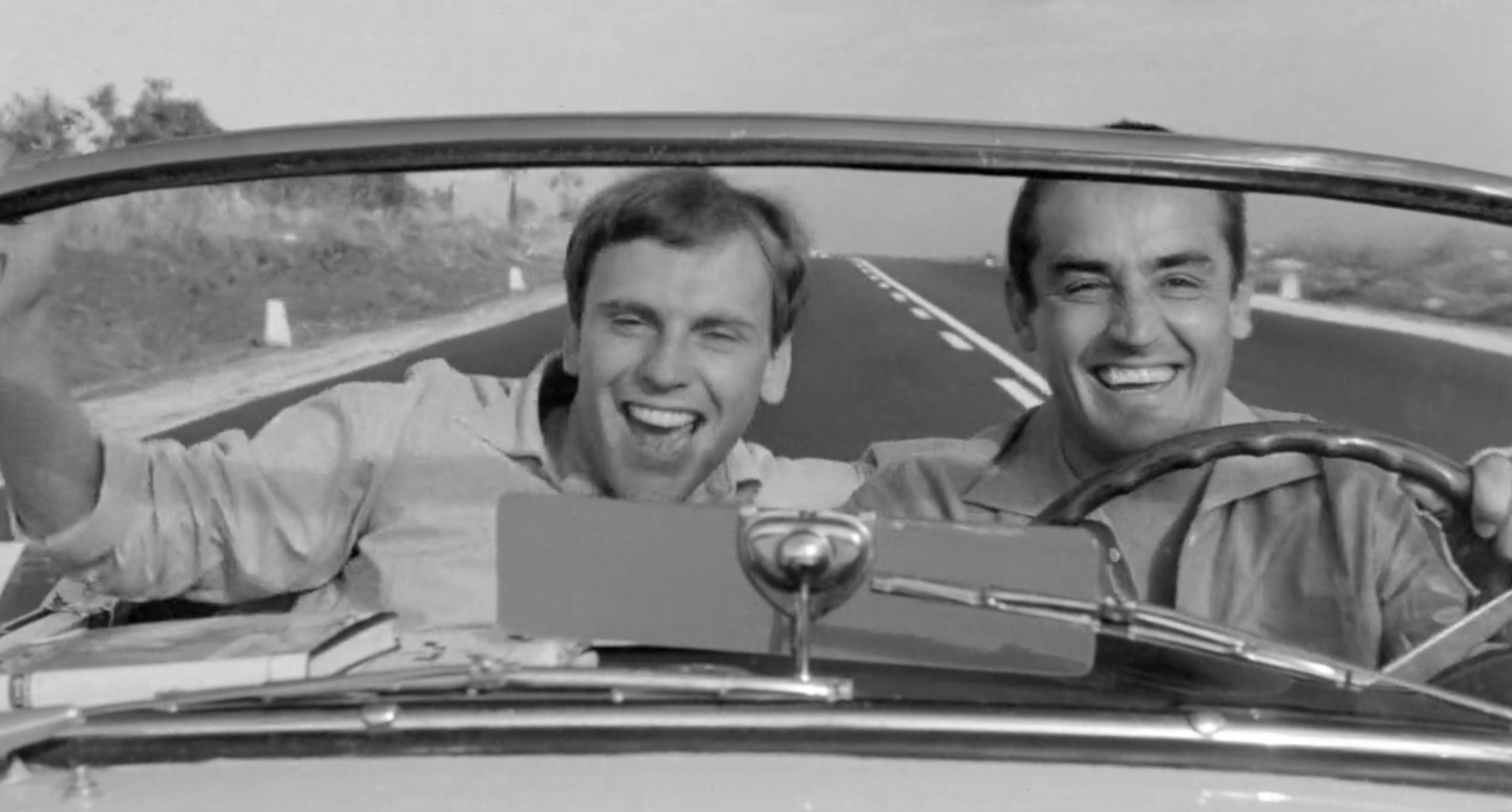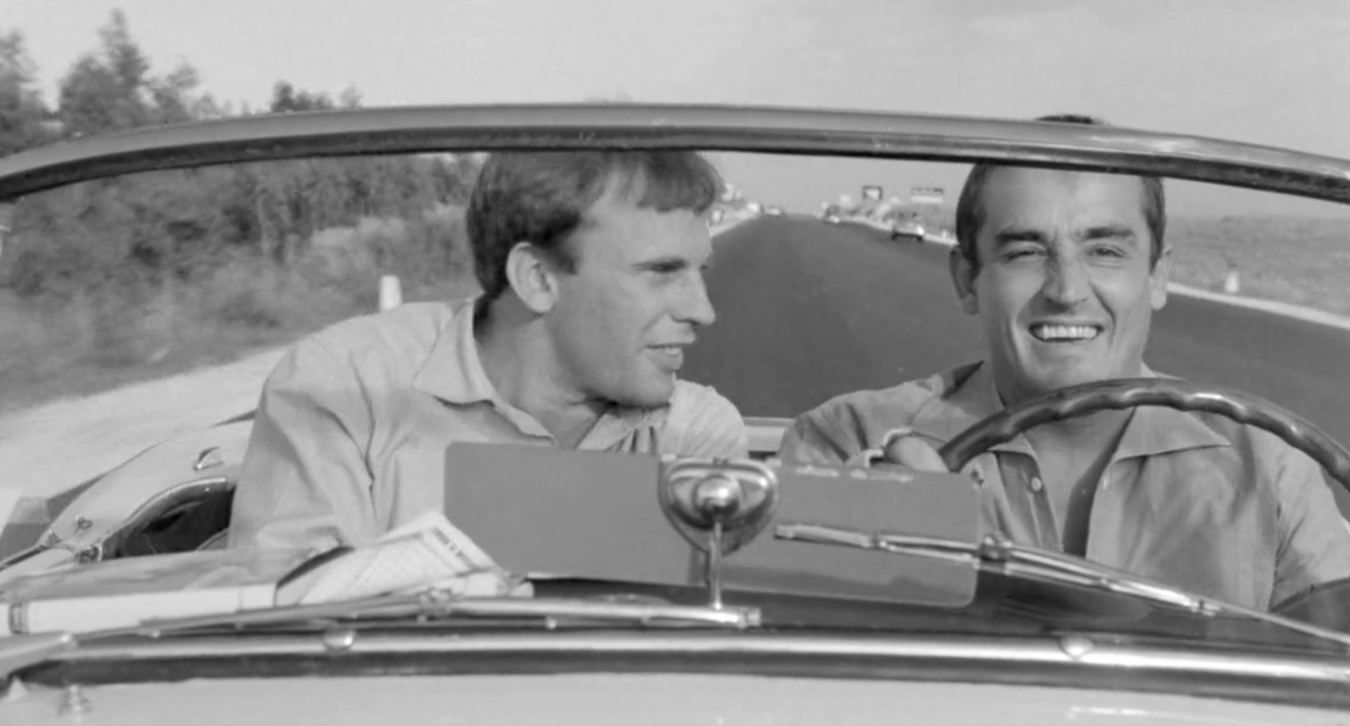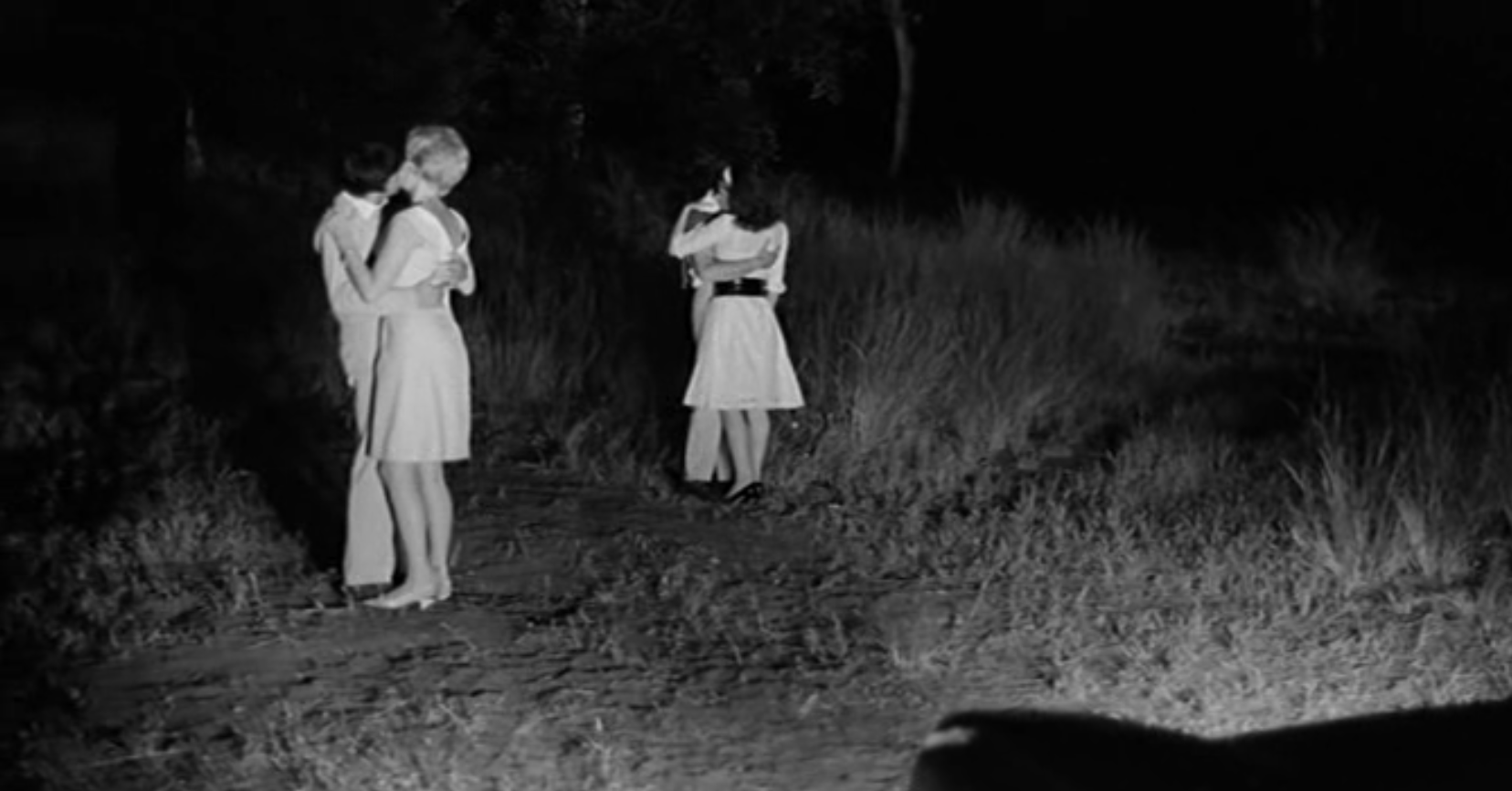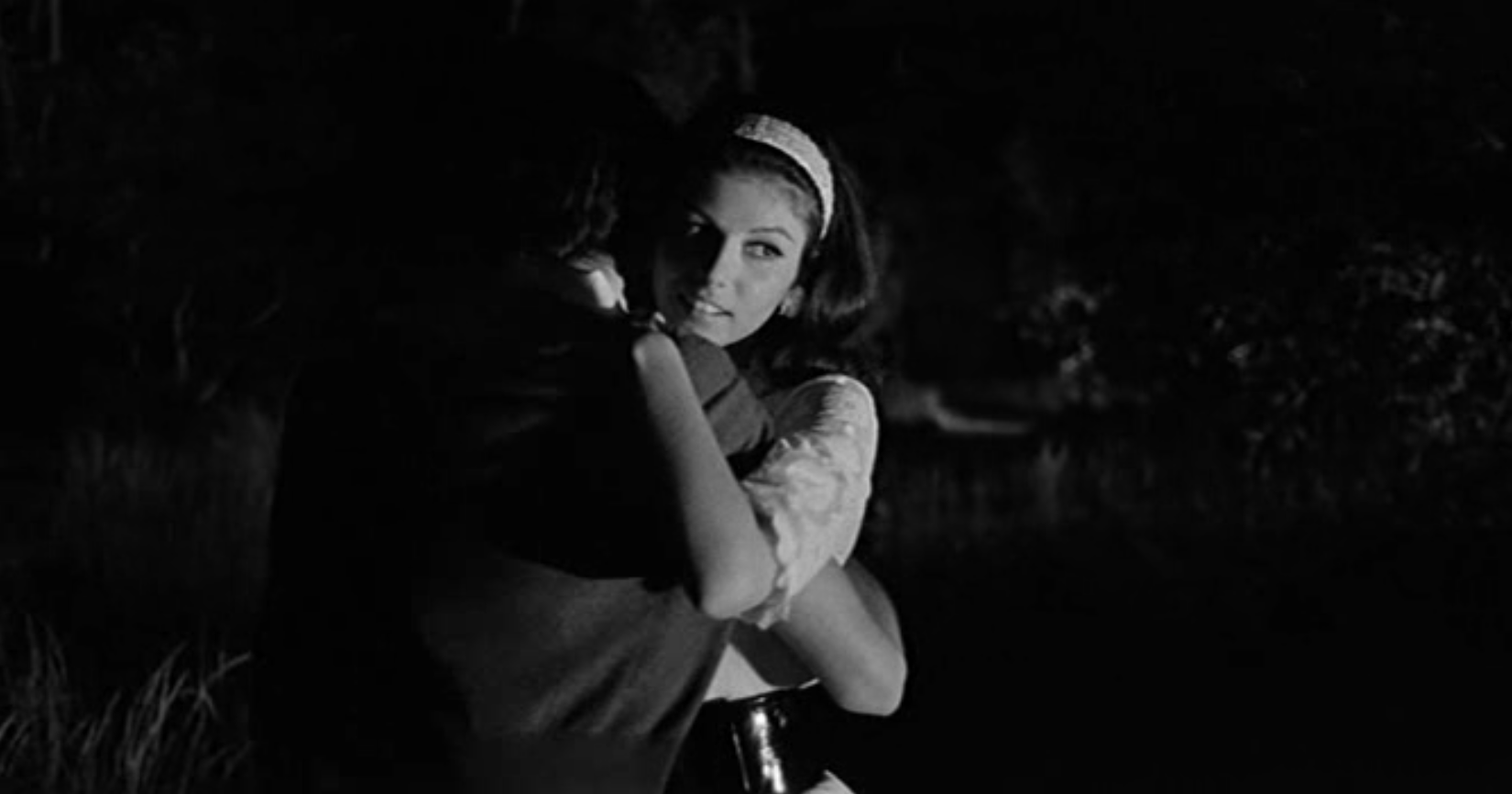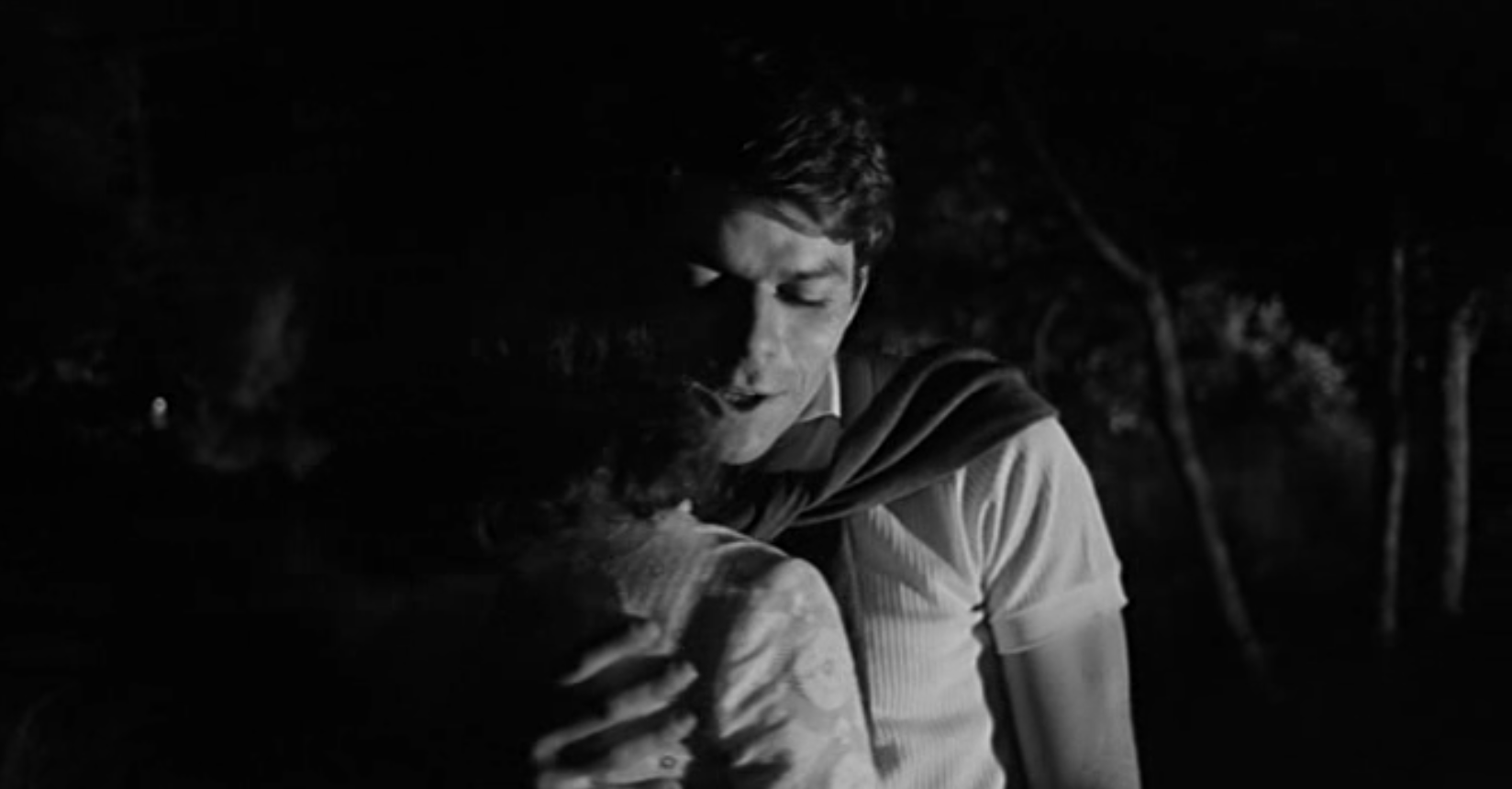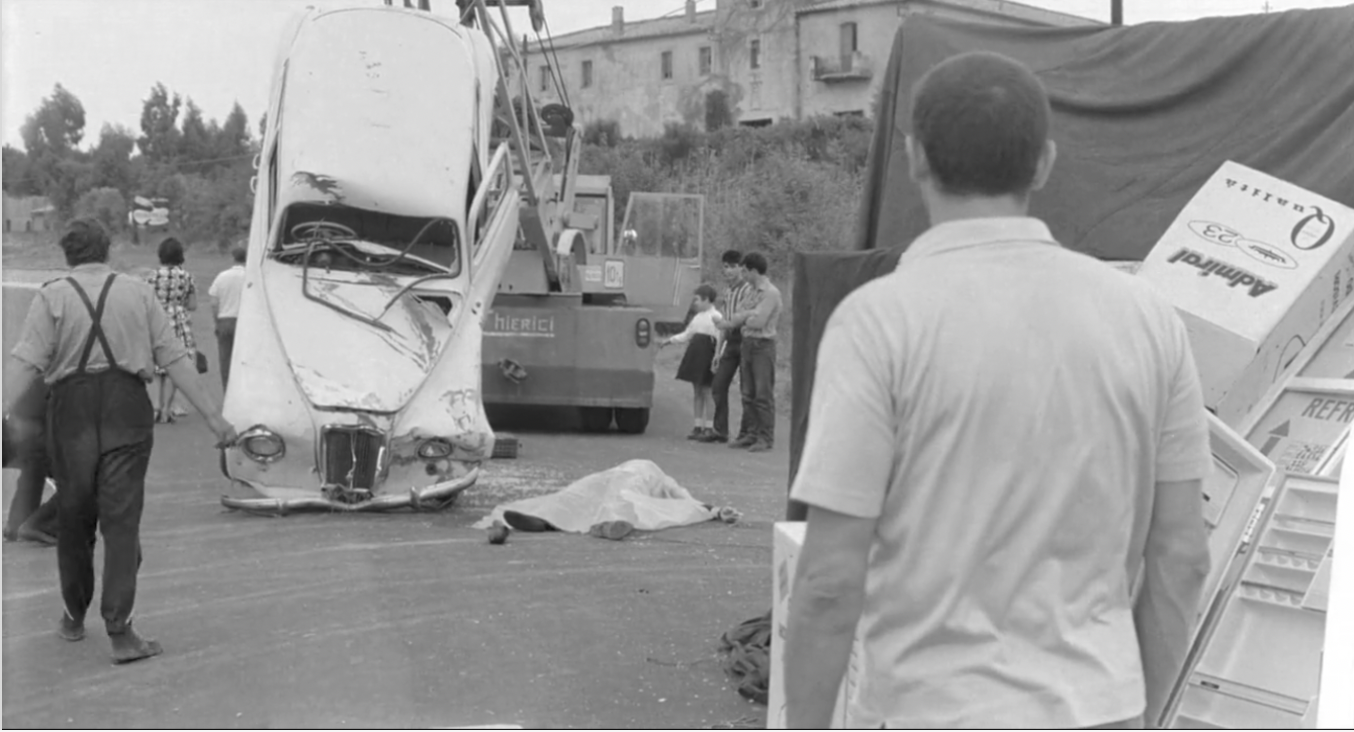Regia / Director: Antonio Pietrangeli, 1965
Un uomo in giacca e cravatta si trova davanti a una libreria. Dice: "Molto bene. Mi dia un bacio". È Vittorio Gassman in La guerra segreta (Carlo Lizzani, 1965).
La macchina da presa stacca su Adriana nell'oscurità, che scuote la testa. "Voi uomini siete tutti uguali".
A man in suit and tie stands in front of a bookcase. He says, “Very well. Give me a kiss.” It’s Vittorio Gassman in The Secret Agents (Carlo Lizzani, 1965).
The camera cuts to Adriana in the darkness, who shakes her head. “You men are all alike.”
Sullo schermo, una donna si avvicina per baciarlo, ma lui aggrotta le sopracciglia. "Mi ha preso proprio per un cretino".
On screen, a woman moves in to kiss him but he frowns. “You took me for a fool.”
La macchina da presa si allontana dal volto di Adriana per includere un'altra giovane donna accanto a lei, che dice: "Certo che è bravo. Poi a me quelli alti…". Entrambe indossano abiti satinati, stretti in vita da una cintura.
Sempre allargando, la macchina da presa mostra file di posti a sedere: le donne sono maschere in un cinema. In cima all'inquadratura, ne vediamo un'altra con una torcia che guida un avventore verso un posto a sedere.
The camera zooms out from Adriana’s face to include another young woman beside her, who says, “He sure is good. It’s tall men for me!” Both wear satiny dresses, tightly belted at the waist.
Still pulling back, the camera shows tiered rows of seats: the women are ushers in a movie theater. At the top of the shot, we see another with a flashlight, guiding a patron to a seat.
"Ne conoscevo uno tale e quale a Pistoia", dice Adriana con un lieve accento toscano, ricordando la sua città natale. "Un po' più bassino magari. Era un ragazzo meraviglioso. Ho preso una cotta per lui!"
La sua collega ride. "Tu ne prendi una alla settimana. Questo è meraviglioso, quell'altro è meraviglioso…"
"Quando andavamo al cinema, lui pagava i biglietti e io i gelati".
"E un signore simile te lo sei fatto scappare?" la prende in giro, mentre Adriana fissa lo schermo con occhi sognanti.
“I knew a gentleman like him in Pistoia,” says Adriana, in a slight Tuscan accent, recalling her hometown. “Maybe a little shorter. He was a wonderful guy. I had such a crush on him!”
Her co-worker laughs. “You have one a week. ‘This one is wonderful, that other one is wonderful...”
“When we went to the movies, he’d buy the movie tickets and I’d buy the ice cream.”
“And you let a gentleman like that get away?” she teases, while Adriana stares dreamy-eyed at the screen.
Senza uniforme, le donne stanno lasciando il teatro.
"Maria, vuoi un passaggio?"
"No, grazie. Mi è venuto a prendere Gino".
"Ciao!"
"Ciao! Ci vediamo domani!"
Out of uniform, the women are leaving the theater.
“Maria, want a ride?”
“No, thanks. Gino came to pick me up.”
“Bye!”
“Bye! See you tomorrow!”
Si affrettano verso le macchine dei loro ragazzi.
They hurry toward their boyfriends’ cars.
Mentre attraversa di corsa la strada, i lunghi capelli di Adriana sventolano dietro di lei. La macchina a cui si avvicina ha una poltrona imbottita sul tettuccio e un cartello con scritto "Poltrone Fabbri".
As she hurries across the street, Adriana’s long hair streams out behind her. The car she approaches has an upholstered chair on the roof and a sign saying “Armchairs by Fabbri.”
Adriana sale accanto all'autista (Claudio Camaso), che dice: "Oh! Ce l’hai fatta!" È il suo primo fidanzato a Roma.
“Ciao!”
"Ma che era? Via col vento?"
"Quasi! È durato più di due ore e mezza".
Adriana gets in beside the driver, who says, “Oh! You made it!“ He’s her first boyfriend in Rome.
“Hi!”
“What was it? Gone With the Wind?”
“Almost! It lasted over two and a half hours.”
Lei si gira e tende la mano alla donna sul sedile posteriore: "Piacere, Adriana Astarelli".
“How do you do?” risponde la donna in inglese.
Adriana saluta l'uomo accanto a lei.
She turns and extends her hand to the woman in the back seat: “Nice to meet you, Adriana Astarelli.”
“How do you do?” the woman answers in English.
Adriana says hi to the man next to her.
Poi chiede al suo ragazzo: "È inglese o americana?"
Lui risponde: "Straniera".
Mentre gli uomini dicono cose irrispettose sulle donne, Adriana rimprovera il suo ragazzo: "Carino! Bravo! Fatti conoscere anche dagli stranieri!” Si rivolge alla donna straniera e spiega: “Lo scusi, eh? I ragazzi in Italia sono tutti scemi, come questi due. Sarà stata la guerra!"
Then she asks her boyfriend, “Is she English or American?”
He replies, “She’s a foreigner.”
As the men make disrespectful comments about women, Adriana scolds her boyfriend, “Cute! Great! Show who you are even to foreigners!” She turns to the foreign woman and explains, “Excuse him, okay? Boys in Italy are all dopes, like these two. It must have been the war!”
L’auto va via. La macchina da presa coglie composizioni astratte nella scena della strada: verticali contro diagonali, luce contro buio.
The car takes off. The camera catches abstract compositions in the street scene: vertical against diagonal, light against dark.
Poi vediamo Adriana, con il vento che le fa sventolare i capelli. Siede sulla poltrona sopra la macchina, libera come un uccello ed euforica.
The next thing we see is Adriana, the wind blowing in her hair. She sits in the chair on top of the car, free as a bird and exhilarated.
La sensazione di libertà che il viaggio in auto portava agli italiani degli anni del boom economico sembra essere un tema cinematografico ricorrente, e non solo ne Il sorpasso (Dino Risi, 1962). Verso la fine di quel road movie, Roberto dice al suo nuovo amico: "Bruno, gli ultimi due giorni che ho passato con te sono stati i più belli della mia vita – davvero!"
The feeling of freedom that riding in a car brought to Italians in the Boom years seems to be a cinematic theme, and not just in Il sorpasso (Dino Risi, 1962). Near the close of that road movie, Roberto tells his new friend, “Bruno, the last two days I spent with you have been the best days of my life – really!”
La gioiosa corsa in auto di Adriana – reale o immaginaria che sia – fa venire in mente l'euforia di Cabiria nel trovarsi sulla decappottabile guidata da un divo del cinema. In piedi sulla macchina, si vanta con le passeggiatrici snob di Via Veneto in Le notti di Cabiria (Roberto Rossellini, 1957).
Adriana’s joyous car ride – whether real or imagined – brings to mind Cabiria’s exhilaration at being in a movie star’s convertible. Standing in his car, she boasts to the snobbish Via Veneto streetwalkers in Nights of Cabiria (Roberto Rossellini, 1957).
Il gruppo ha parcheggiato in un'area deserta. Illuminate dai fari, le coppie ballano al ritmo della musica della radio. La straniera bacia il suo accompagnatore.
Adriana canta insieme alla radio:
È troppo tardi
Troppo tardi per noi*
*Da "Addio" (musica di Piero Piccioni; testo di Antonio Murri, 1965), interpretata da Mina.
The group has parked in a deserted area now. Lit by the headlights, the couples dance to music from the radio. The foreigner is kissing her date.
Adriana sings along with the radio:
It’s too late
Too late for us*
*From “Addio” (music by Piero Piccioni; lyrics by Antonio Murri, 1965), sung by Mina.
"Beata lei!" dice Adriana al suo ragazzo.
"Chi?"
"Quella! È fortunata, sta in Italia".
Con un sorriso, lui risponde: "Scusa, ma perché? Noi dove siamo?"
"Che c'entra? Lei è straniera. Qui sta all'estero, noi no!"
“Lucky her!” Adriana says to her boyfriend.
“Who?”
“That girl. She’s lucky she's in Italy.”
With a smile, he answers, “Excuse me, but why? Where are we?”
“What does that have to do with it? She’s a foreigner. Here, she’s abroad, we’re not!”
Ballano un altro po’, ma poi lei lo spinge via: "Ma fammi almeno respirare, scusa!" Lui sorride mentre lei continua: "Non lo so, ma all’estero deve essere tutto diverso. Sei indipendente, sei considerata di più, sei più libera, no?"
They dance a little more, but then she pushes him away: “At least let me breathe, sorry!” He smiles as she continues, “I don’t know, but abroad everything must be different. You’re independent, you’re valued more, you’re freer, aren’t you?”
"Dipende. Un mio amico in Belgio l'hanno schiaffato in galera!"
"Quando fai finta di non capire, mi fai una rabbia!"
“Depends. A friend of mine, they threw him in jail in Belgium.”
“When you pretend not to understand, you make me so mad!”
"Ma no, parla, parla. Stai tranquilla. Ti ho capita". Lui le mette una mano sul posteriore.
"Eh, no! Ho capito io te!" dice lei, togliendogli la mano.
“No, go on, talk. Take it easy. I understood you.” He puts his hand on her behind.
“Uh, no! I did understand you!” she says, removing his hand.
Mentre ballano, lei ricomincia a cantare con la musica della radio, ad occhi chiusi:
Ancora un bacio
Ma sarà l'ultimo
As they dance, she sings again along with the radio music, eyes closed:
One more kiss
But it will be our last
Di nuovo in macchina, la coppia sul sedile posteriore si sta ancora baciando. Adriana canticchia con la radio. Mentre guidano, i ragazzi scherzano, ma i loro commenti infastidiscono Adriana.
Back in the car, the couple in the rear seat is still kissing. Adriana sings softly along with the radio. As they drive, the guys joke around, but their comments irk Adriana.
La macchina si ferma bruscamente e, attraverso il parabrezza, vediamo un camion e delle figure in piedi sulla strada. Un corpo giace a terra.
The car stops abruptly and, through the windshield, we see a truck and figures standing in the road. A body lies on the ground.
Mentre Adriana scende dalla macchina, un cavallo nitrisce. La pubblicità dei mobili sul tettuccio incombe nell'inquadratura.
As Adriana steps out of the car, a horse neighs. The furniture ad on the roof looms in the shot.
I cavalli bianchi e irrequieti sono stipati nel retro del camion. Due uomini fissano un corpo immobile.
I fari del camion illuminano Adriana nel suo vestito bianco. Anche i cavalli bianchi sembrano brillare, creando un'unificazione visiva da una parte all’altra della strada.
Restless white horses are packed in the back of the truck. Two men stare at an immobile body.
The truck’s headlights illuminate Adriana in her white dress. The white horses seem to shine, as well, making a visual unification across the road.
Adriana abbassa lo sguardo per fissare il corpo coperto da una giacca; una scarpa si è sfilata.
Adriana stares down at the body covered by a jacket; one shoe has come off.
Uno dei cavalli nitrisce di nuovo. Adriana guarda verso di loro e li vede lottare contro i loro vincoli.
One of the horses neighs again. Adriana looks over and sees them struggling against their constraints.
Un uomo robusto, con la faccia insanguinata e sconvolto, dice ad Andriana: "C'era un ciclista. Ho dovuto sterzare". Lei lo guarda senza compassione. "C’era un ciclista proprio in mezzo alla strada. C'era un ciclista".
A rugged man, his face bloodied and distraught, tells Andriana: “There was a cyclist. I had to swerve.” She looks at him without compassion. “There was a cyclist right in the middle of the road. There was a cyclist.”
Ci ricorda la scena del camion distrutto de Il sorpasso: l'autista stordito, con la testa tra le mani; il corpo coperto da un lenzuolo; il nostro protagonista come testimone silenzioso.
It reminds us of the scene with the wrecked truck in Il sorpasso: the stunned driver, head in hands; the body covered by a sheet; our protagonist as silent witness.
Il ragazzo di Adriana si avvicina e le passa una mano sulla spalla. Lei la afferra con la sua. Insieme, guardano senza pietà l'autista insanguinato. La macchina da presa zooma sul volto turbato di lei.
Adriana’s boyfriend approaches, putting one hand over her shoulder. She grasps it with hers. Together, they gaze unforgivingly at the bloodied driver. The camera zooms in on her troubled face.
FINE PARTE 2
Ecco Parte 3 of this cineracconto! Subscribe to receive a weekly email newsletter with links to all our new posts.




